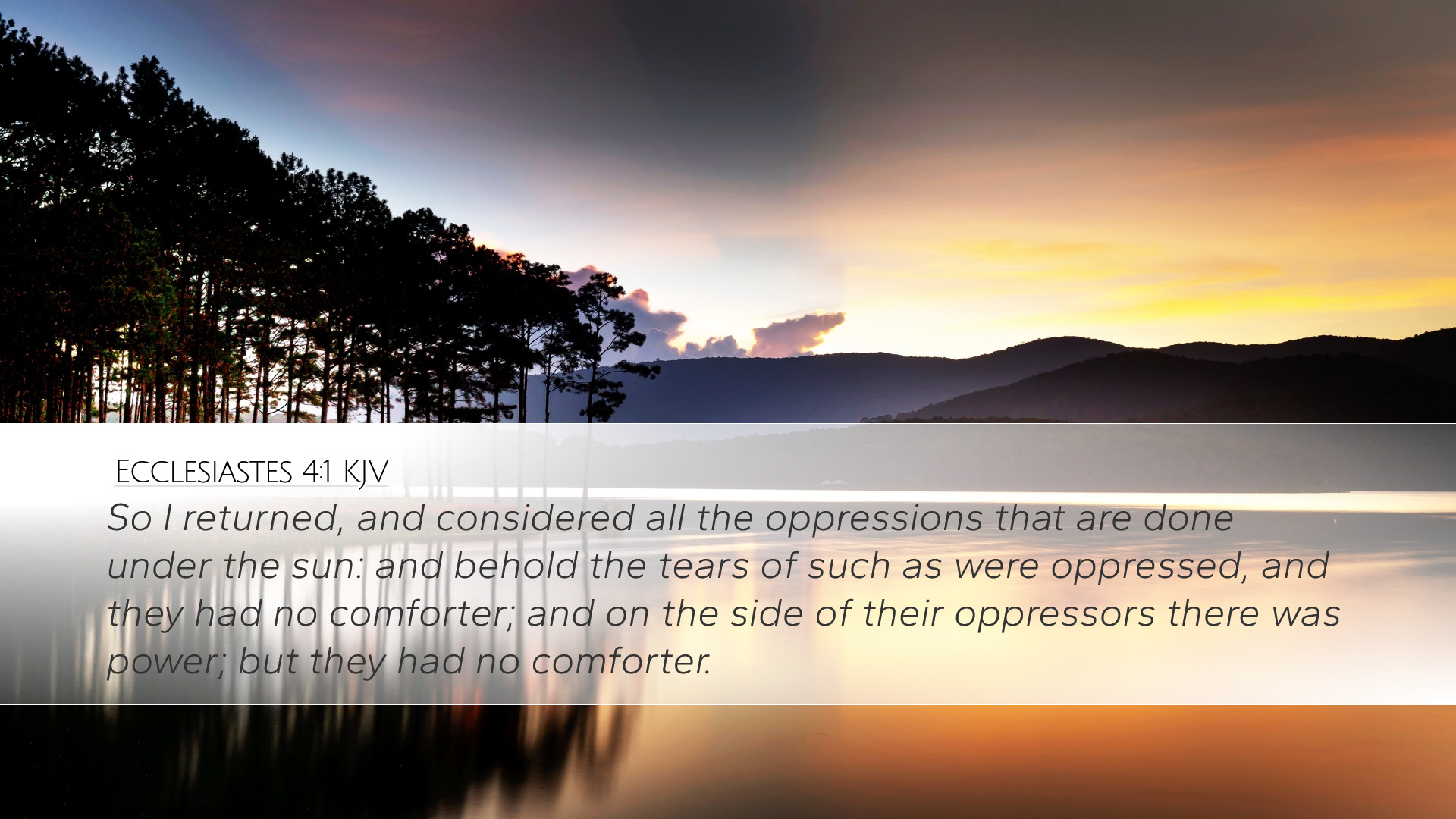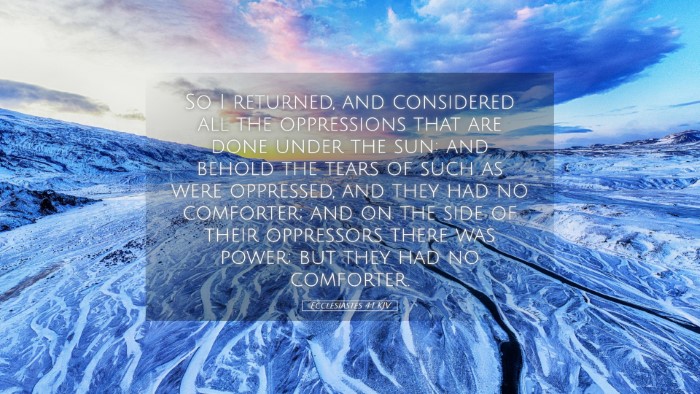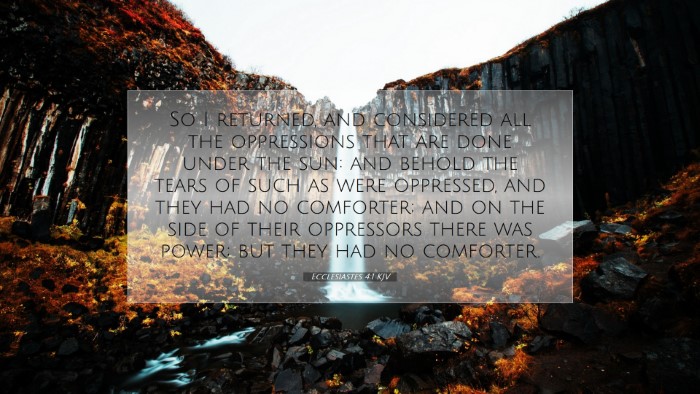Old Testament
Genesis Exodus Leviticus Numbers Deuteronomy Joshua Judges Ruth 1 Samuel 2 Samuel 1 Kings 2 Kings 1 Chronicles 2 Chronicles Ezra Nehemiah Esther Job Psalms Proverbs Ecclesiastes Song of Solomon Isaiah Jeremiah Lamentations Ezekiel Daniel Hosea Joel Amos Obadiah Jonah Micah Nahum Habakkuk Zephaniah Haggai Zechariah MalachiEcclesiastes 4:1
Ecclesiastes 4:1 KJV
So I returned, and considered all the oppressions that are done under the sun: and behold the tears of such as were oppressed, and they had no comforter; and on the side of their oppressors there was power; but they had no comforter.
Ecclesiastes 4:1 Bible Commentary
Commentary on Ecclesiastes 4:1
Verse: "So I returned and considered all the oppressions that are done under the sun: and behold the tears of such as were oppressed, and they had no comforter; and on the side of their oppressors there was power; but they had no comforter." (Ecclesiastes 4:1)
Introduction
The book of Ecclesiastes presents a profound meditative reflection on the human experience, focusing on the fleeting nature of life, the inevitability of death, and the existential findings of the Preacher, traditionally credited to King Solomon. Ecclesiastes 4:1 confronts the grim realities of oppression and the absence of comfort for the oppressed. This commentary seeks to explore these themes through the insights of esteemed public domain commentaries.
Textual Analysis
The verse begins with the phrase "So I returned and considered" which indicates a reflective return to observation—an essential part of Solomon's philosophical inquiry. The repeated use of "comforter" emphasizes the emotional and spiritual desolation that oppression brings to individuals.
Matthew Henry's Commentary
Matthew Henry emphasizes the sorrowful reality of oppression, illustrating how the oppressed are often left in despair, crying out for justice and solace. He notes, "the tears of the oppressed signify their deep anguish and sense of abandonment," suggesting that while earthly power may be wielded by oppressors, it does not equate to true authority in the moral sense.
- The Nature of Oppression: Henry describes oppression as an inescapable reality of human existence under the sun. It highlights a world marred by sin where injustice often prevails.
- The Silence of Comfort: The absence of a comforter is particularly striking. Henry points out that the oppressed often find themselves without human aid or divine consolation when facing their trials.
Albert Barnes' Commentary
Albert Barnes provides a nuanced interpretation focusing on social justice and its implications. He suggests that the oppression seen 'under the sun' serves as an indictment of humanity's failings. Barnes remarks, "the oppressor's power is not the strength of righteousness but rather a tyranny that overlooks the cries of the vulnerable.”
- Human Rights: Barnes posits that the inequalities faced by the oppressed serve as a meter for societal ethics, urging a collective responsibility among those in power.
- Divine Justice: He conveys hope by affirming that while oppressors may seem powerful, God's ultimate justice prevails, reminding readers that divine oversight is inescapable.
Adam Clarke's Commentary
Adam Clarke brings to light the psychological and emotional toll of oppression. He expounds, "the tears of the oppressed convey a deep inner conflict that echoes through generations." Clarke highlights the social impotence of the oppressed, emphasizing how their powerlessness exacerbates their sorrow.
- Empathy and Action: Clarke encourages believers to empathize with those who suffer, urging a proactive stance against injustice, as love and justice are central tenets of the Christian faith.
- The Role of Community: He points out the importance of community, asserting that shared suffering can foster solidarity among the oppressed and bring about a measure of comfort.
Theological Implications
This verse not only reflects on the reality of human suffering but also prompts a theological inquiry into the nature of God in the presence of evil and suffering. The deep anguish expressed serves as a reminder that believers are called not only to witness but to act against such injustices.
- The Problem of Evil: The text confronts the age-old question of why a just God permits oppression to occur. In engaging with this question, theologians remind us of the immediate human condition and the eschatological hope that ultimately, God's justice will be realized.
- Personal Responsibility: Individually, the faithful are called to respond to the needs of the oppressed, living out the gospel through compassionate action and advocacy.
Conclusion
Ecclesiastes 4:1 encapsulates profound insights into the nature of suffering and oppression. The combined wisdom from Henry, Barnes, and Clarke integrates a call to awareness and action. As believers reflect on this verse, the dual themes of human despair and divine justice serve as a challenge to persevere and bring comfort to those who suffer injustice in our communities. The rich insights from these commentaries should inspire pastors, scholars, and all believers to both understand deeply the nature of human suffering and take meaningful actions rooted in love and justice.


